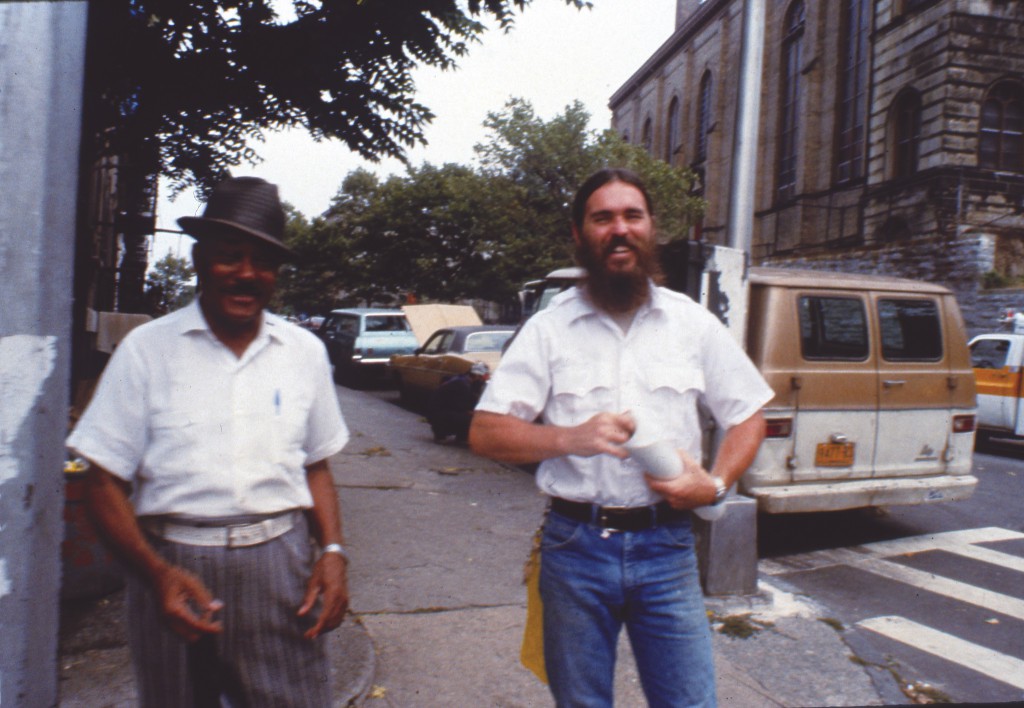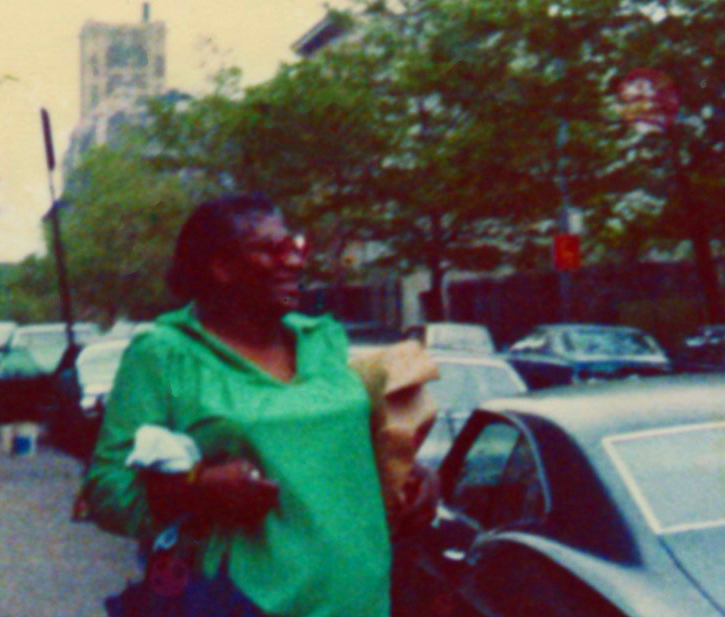It is a short drive over the George Washington Bridge from New Jersey into New York City. Often, the ride is even pretty. The bridge is an awesome structure: a ten-lane super highway suspended from cliff to cliff over the Hudson River by miles of cables, enough to circle the earth a few times.
I planned to meet the famous structure at precisely 10 a.m. Barring an accident clogging a few lanes, I should be able to drive right over and into Manhattan, then quickly straight into the Bronx.
It is 1977. I am 24 years old, my wife is with me, four months pregnant. We are going to the South Bronx to live with some friends from Plenty in what was an abandoned building. The building on Fulton Avenue is in a neighborhood that was noted to be the poorest and most dangerous area in the U.S.A. We will all be about the only white people for many blocks in any direction. We arrive to help start an all-volunteer ambulance service. The South Bronx has the slowest emergency response time of any urban area in the U.S.A.
I have so far in life barely supported myself. Within four months I will be in charge of supporting all fifteen adults and eleven children who have moved into the building.
My dad grew up in Manhattan. And we lived just a few miles away in New Jersey. He had nice memories of the town. But never did we drive on a single street in the South Bronx. The closest was, like most Northeasterners: we saw the abandoned and burned buildings at 50 mph, from I-95, The Cross Bronx Expressway. I was told: The Bronx is a ghetto. A cruel and rough place. With dangerous people.
Most of my Plenty friends came to the South Bronx very focused. They were there to establish a volunteer ambulance service. My focus was with them, but for me there was something as important. I wanted to live there, to meet these people I had previously only driven by, and to share life with them. To let them know not all white people thought they were strange, or violent, or different. To live what I felt: there is one race — the human race.
Many of the long time residents of the South Bronx were immigrants from the South: Georgia, Mississippi, South Carolina. They had been there when a black person could not walk into a white bar. They had a gentle southern accent and slow moving way about them. And since most of us at Plenty had spent several years at the Farm in Tennessee, we immediately found common ground and understanding in accents, foods, and styles.
Initially, of course, there was some feeling-out to do. All of the guys in Plenty had long hair; mine was all the way down my back. We dressed like we were about to go hoe the tomatoes or pick okra in Tennessee. We were not like the intellectual types that came to study the neighborhood and went each night back to Connecticut or Long Island.
And none of us had any money. Actually, most of the local residents had more money and possessions than us. As we got to know each other, the local folks appreciated that this building was occupied. They were fascinated with rough country-style survival skills and our smiles. Our hippie ways provided them endless entertainment. They noticed with keen interest that we took care of our children and kept things up. We jump-started each other’s cars and swept the sidewalks.
When they had an emergency, they called or knocked on the door. And when we needed a vehicle fixed, directions, and such, we called on them. As time went on, we took care of many of their children while they were at work or out for the evening.
The South Bronx kids loved our beans and tortillas — our daily lunch. I can tell you without any reservations, these kids had a profound effect on every one of us that lived in the Plenty Bronx center.
This was not suburbia. On a hot day, most of our neighbors would sit out on the steps after work and have a beer, play cards, tell stories, share laughter, or walk their dogs. We would often bring a soda and some chips and join them.
Though two-thirds of the buildings were abandoned and burnt up, this was a very alive neighborhood. In the winter, there was always a barrel with a fire to stand around, fueled with wood trim taken out of one of the many abandoned buildings. It is on one of these evenings that Pat and I first met Vivian Gambles. She had a nice older German shepherd named King. She and her dog would cruise the street in the early evenings of every season bringing cheer and fun conversation.
Gradually we became friends with many of the long time residents. But with Vivian, we started a friendship that would change the lives of our families, and last until her passing, 23 years later.
The year we met, Vivian Gambles was 55 years old. Tall. She stood bout 5′ 10″, maybe 240 pounds, and as she would say, “Baby, God made me blacker than the darkest night.” She called us “Pat and Bob” refusing to use the more formal “Patricia and Robert” that the Farm preferred.
On a hot evening, Vivian could be seen and heard for blocks. Every eve, every night we were there, she would park herself on the sidewalk in front of the Plenty building and look up and yell with a voice that could crack crystal and a volume to drown out the trains, “Bob, Pat, it’s Vivian! It is Vivian darling! Viv-e-ann. It’s me! Come down and talk to me, I’m lonely, lon-e-ly! It’s Vivian and I’m lonely, come on down now, don’t make ol’ Vivian walk up all those stairs, you know I’m too old, just too old and heavy for all that. Come down and tell ol Viv-e-ann what’s happenen.”
Patricia or myself would open the window from our fourth floor apartment and yell down, with a little Southern in our voice, “Miz Gambles! Now look at you. How are you, how was your day?”
Vivian would answer, “I’ve been on my feet all day, come down here, I have something to talk to you about!”
So down we went and after a hug and hello, began laughing to tears. King would just sit still and admire his Vivian. “Pat, how’s my baby doing? (Meaning when is your baby going to be born?) Now don’t do like ol’ Vivian did — when that baby comes out, you do like this.”
In October, the day after our son Sam was born, we took him down to the sidewalk to meet Vivian. She was there on the street, “Pat, Bob, it’s Vivian dar-ling, bring me that little boy now, I need to hold him and give him a nice kiss like he will never have.” Ms. Gambles held him; she held him proudly, with a glow in her eyes, her eyes that could put anyone at peace, “That’s my boy now, that’s my boy. He is a good boy. The best son.”
Indeed Vivian did become Sam’s godmother. And for all his life, years after we moved from the Bronx, and later down to Florida, the two of them would be sure to see each other, Sam always knowing that this amazing woman loved him as her own child. For both of our families it was in fact the first time either had become this close with the other’s race, sleeping in each other’s homes, sharing meals, sorrows, and joys.
“How’s my baby?” Vivian asked Sam when he was nine years old, on a visit to Florida. “How’s my godson? Now Sam! Let’s see a smile, don’t take life too serious now, you know God loves you and ol’ Vivian loves you and me and ol’ God cover a lot of ground now, we done got you covered for love.”
A month or so after Sam’s birth, Vivian was looking for a change in scenery and she knew we were a little short on money. So she asked me to do some painting and wallpapering in her apartment, just two buildings up the street.
King had enjoyed rubbing the entry hall walls, giving a dark stain. Many times as the years went by I remembered the wallpaper I hung: aluminum foil paper with tropical plants and then painted tropical green walls that transformed her home with a bright, eye-catching southern style. Vivian had a party and invited Patricia, myself, and all her friends. And for twenty years whenever we talked on the phone or met in person, she would say, “Still got my tropical par-a-dise. Yes Sir, love that hallway.”
If there was one thing that stood out about Ms. Gambles besides her cheer, generosity with her spirit, and love of her children and grandchildren — it was her forgiveness — her ability to change an uncomfortable moment into a blessing.
Once Vivian was visiting us in Gainesville, Florida. We were playing outside in front of the house, a car drove by and asked Vivian, to our embarrassment, if she did cleaning. Vivian responded, with a star in her eye and a huge soft gentle smile, “No sweetie, I’m moving in — there go da neighborhood.” We all laughed. The neighbor just had to laugh. And when she tried to apologize, Vivian would hear nothing of it; her huge smile and tender eyes spoke forgiveness and care. In a minute we were all sharing stories.
That visit Vivian told us the good news: she had been promoted at work. After twenty-six years she was finally promoted. Her boss came up to her a few months later and said, “Vivian, can you ever forgive me?” Vivian said, “What you talkin’ ‘bout?” knowing full well her boss was referring to the fact that for the last twenty years the department head had promoted other less experienced and less qualified white workers over Vivian.
Her boss said, “Viv, for twenty years I made a mistake, and this department never has been more productive than now, after you took charge. How can you ever forgive me?”
Vivian told her, “That’s okay baby, you got it right this time. That’s okay now, don’t you go worrying about the past now, all that matters is right now.” The two hugged and the boss cried.
We met many wonderful people in the Bronx and had many amazing beautiful experiences. But Vivian Gambles was special. She shared her heart, generous spirit, love, kindness, and forgiveness. And our family was forever happier and kinder for it.
We last saw her not long ago. She was still living in the same apartment on Fulton Ave, except the landlord had relocated her temporarily while he remodeled the building.
Vivian told us she warned him, “Don’t go make ol’ Vivian mad now and tear out the wallpaper in the hallway. My son hung that paper. You hear me? Sir, now listen, and listen good! Cause ol’ Vivian ain’t gonna speak it a-gain, I know you don’t want to see me upset now. I can’t LIVE without that foil paper!” The poor man must have been shaking.

Laughter roared from all of us as Ms. Gambles told the story that night. The neighbors would have thought we were all yelling up to the fourth floor.




